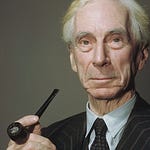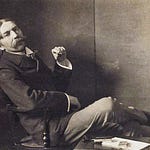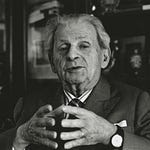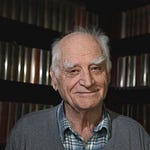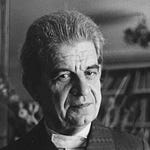Do you live with a constant, nagging feeling that you are behind? It’s the quiet hum of anxiety beneath the surface of modern life, the sense that your existence is a resource you are constantly mismanaging, wasting, or running out of. A century ago, the philosopher Henri Bergson identified the source of this spiritual sickness: our surrender to the tyranny of the ticking clock.
This article uncovers the forgotten wisdom of Henri Bergson, whose work reveals the profound difference between the time we measure and the time we actually live. We explore Bergson’s crucial distinction between “clock time”—the artificial, spatialized grid of seconds and minutes that governs our schedules and industries—and “durée”, or duration, the rich, melodic, and indivisible flow of lived experience.
We have mistaken the map for the territory. By forcing the messy, beautiful reality of our inner lives to conform to the mechanical logic of the clock, we have created a profound alienation from our own being. This is not just abstract philosophy; it is the hidden engine behind burnout culture, the productivity obsession, and the existential dread that defines our age. The insights of Henri Bergson offer more than a diagnosis; they provide a path to liberation. By understanding the cage, we can finally learn how to find the door. This isn’t about time management; it’s a guide to reclaiming the very substance of your life from a system designed to crush it. Discover what the French philosopher Henri Bergson knew, and what we have dangerously forgotten.
The Tyranny of the Ticking Clock
We live by the clock. From the moment the alarm jolts us awake, to the precisely scheduled meetings, the timed commutes, and the frantic scramble to “make the most” of every minute, our lives are partitioned, diced, and managed by an invisible, relentless master. This is “clock time.” It’s a convenient fiction, a necessary tool for industrial coordination and societal organization.
But what if this tool, so essential for our collective efficiency, has become a weapon against our individual well-being? Bergson argued that clock time is a spatialization of time. We treat it like a line, a series of discrete points, segments we can fill, save, or spend. We quantify it, commodify it, and in doing so, we strip it of its true essence. This mechanical view reduces life itself to a series of measurable units, pushing us into a perpetual state of “behind-ness.” Are we truly living, or are we just meticulously managing our allocated minutes?
Durée: The River of Life
Opposite this artificial construct, Bergson introduced us to “durée”, or duration. This is not time as measured by a clock, but time as lived. It is the continuous, indivisible, qualitative flow of our conscious experience. Think of a melody. You cannot break it down into individual notes and understand the melody itself; the meaning emerges from the continuous unfolding, the relationships between the notes, the whole experience. Durée is like that.
It’s the seamless progression of our inner life, where past, present, and future are not separate compartments but meld into a rich, evolving tapestry. When you are truly immersed in an activity, perhaps a deep conversation, creating art, or simply lost in nature, the clock disappears. That is duration asserting itself. It is rich, qualitative, and deeply personal, defying all attempts to quantify or divide it. Is our modern life structured to facilitate these moments, or to constantly interrupt them?
To exist is to change, to change is to mature, to mature is to go on creating oneself endlessly.
— Henri Bergson
Mistaking the Map for the Territory: The Invisible Prison
Here lies the crux of our modern predicament. We have taken the map—clock time, with its neat divisions and predictable segments—and mistaken it for the territory—the wild, unpredictable, and fluid landscape of duration. We demand that our inner, lived experience conform to an external, mechanical rhythm. We force creative bursts into 30-minute slots. We rush meaningful conversations. We interrupt moments of profound connection with an eye on the clock. The result? A profound alienation from our own being.
This isn’t just about “busy-ness.” This is the “invisible prison” that has stolen our lives. It fuels the relentless churn of burnout culture, the obsessive quest for “productivity hacks” that only serve to make us feel more inadequate, and the insidious existential dread that whispers: “you’re not doing enough, you’re running out of time.” We’re trapped, not by physical bars, but by a conceptual framework that dictates our worth based on how efficiently we perform within its artificial grid. Do you feel this pressure, this constant internal critic? It’s Bergson’s warning made manifest.
Radical duration is the continuous progress of the past which gnaws into the future and which swells as it advances.
— Henri Bergson
Unlock deeper insights with a 10% discount on the annual plan.
Support thoughtful analysis and join a growing community of readers committed to understanding the world through philosophy and reason.
A Path to Liberation: Reclaiming Your Life
Bergson’s insights offer more than a diagnosis; they provide a profound path to liberation. This isn’t about ditching your watch or abandoning all schedules. It’s about remembering which is primary: the clock, or your life. It’s about learning to distinguish between the artificial construct and the vital, ongoing reality of your duration. How do we begin to dismantle the bars of this invisible prison?
Conscious Awareness: Start by noticing when you are operating purely by clock time versus truly experiencing duration. When do you feel rushed, fragmented, anxious? When do you feel integrated, absorbed, alive?
Cultivating “Flow”: Seek out activities that naturally dissolve the clock. These are the moments of “flow” where you are so deeply engaged that time ceases to exist. Prioritize them. Protect them.
Resisting Spatialization: Challenge the urge to break down every experience into discrete, measurable units. Allow for open-endedness, for moments of simply “being” without a specific quantifiable outcome.
Re-evaluating “Productivity”: Question the dominant narrative of productivity. True fulfillment often comes from deep, continuous engagement (duration), not from maximizing units of output in minimal clock time.
By understanding the cage, we can finally learn how to find the door. This isn’t about time management; it’s a guide to reclaiming the very substance of your life from a system designed to crush it.
Henri Bergson’s wisdom, so relevant a century ago, is perhaps more critical now than ever before. We have dangerously forgotten the difference between the map and the territory, allowing the artificial tick-tock of the clock to override the natural, vital rhythm of our own existence. But it doesn’t have to be this way. By rediscovering the profound reality of duration, by recognizing the invisible prison we’ve built around ourselves, we can begin the work of liberation. We can challenge these hidden structures and reclaim not just our time, but the very essence of our lives. What is the one activity that makes the clock completely disappear for you? Let’s collectively explore how we can live more deeply, more fully, beyond the tyranny of the ticking clock.




